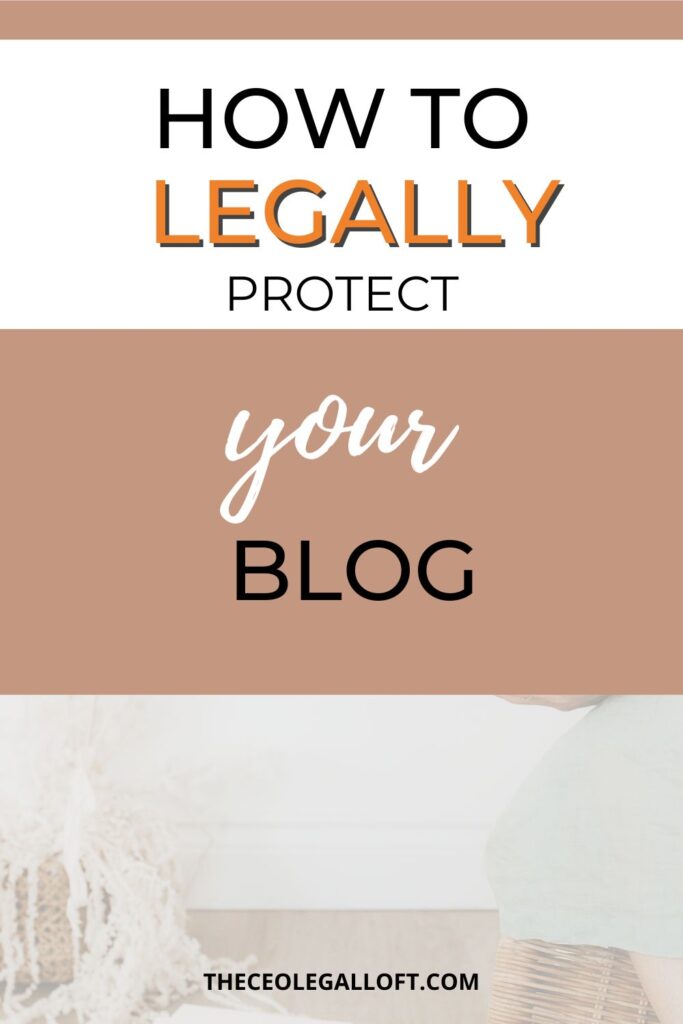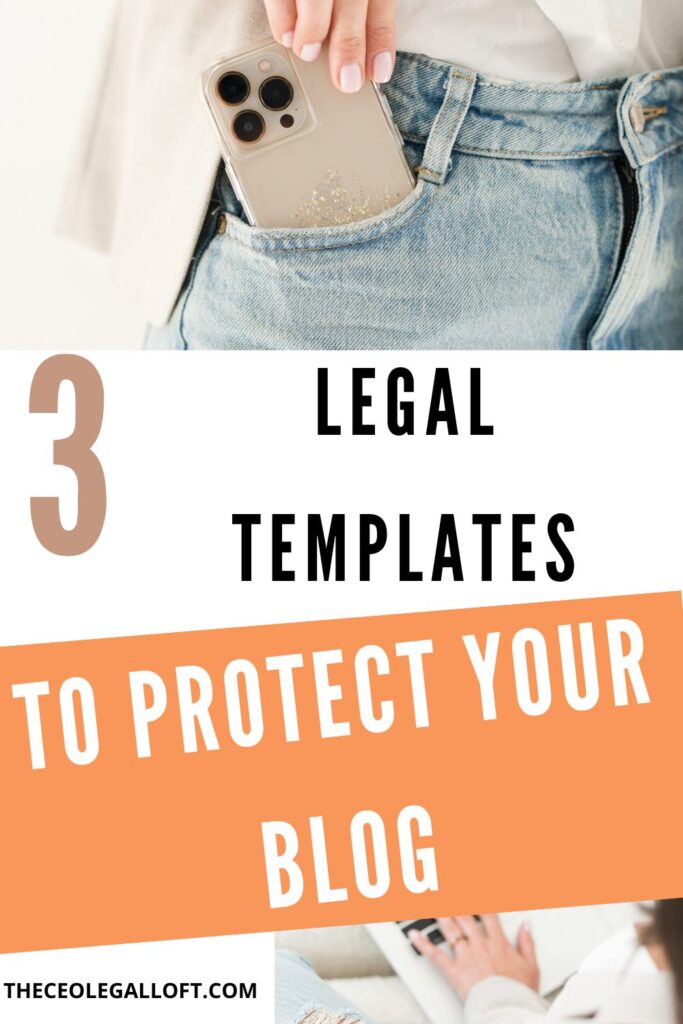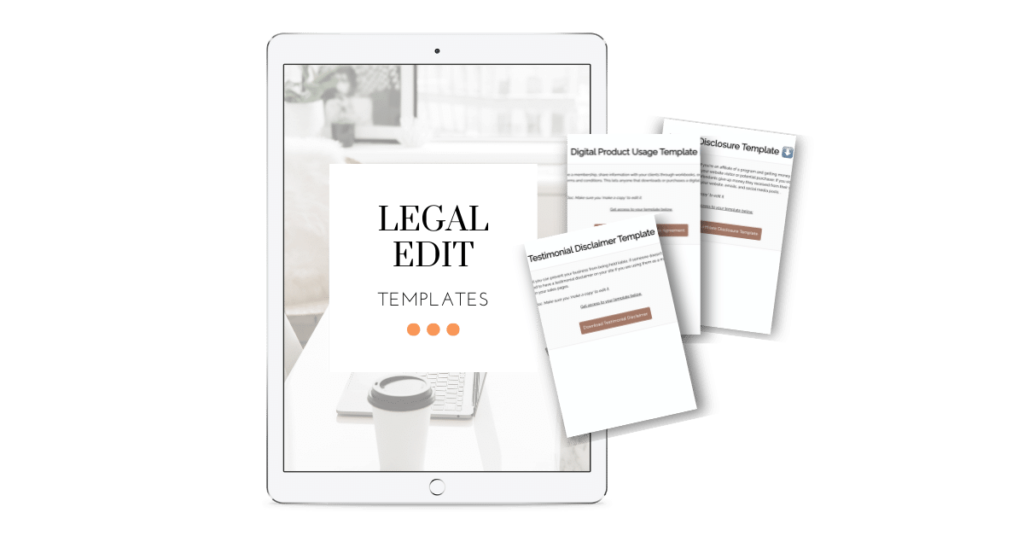Blogging is a way to express yourself, help others, and creates way that you can work for yourself. As you embark on this exciting journey, creating mesmerizing content and engaging your readers, there’s an essential aspect you may be overlooking: how to legally protect your blog. It’s vital to understand how to shield your blog legally, and we’re here to guide you through it.
Navigating Potential Legal Pitfalls of Blogging
Blogging is more than just sharing personal anecdotes, stringing together compelling narratives, or crafting insightful how-tos. As you begin writing, you also enter a complex digital ecosystem with challenges and potential pitfalls like:
Content Theft
It’s disheartening to discover that someone has lifted your painstakingly crafted content without your consent. It’s not just an affront to your hard work but also a direct violation of copyright laws. There’s a difference between genuine sharing and blatant stealing, and it’s crucial to be vigilant against the latter.
Copyright Infringement
On the flip side, there are intellectual property rights you have to be concerned with like using images, videos, or content without proper licensing or attributions. Always ensure that you have the right to use any external content you incorporate into your blog. Otherwise, you may face legal penalties and, at the very least, a takedown notice.
Privacy Concerns
If you’re collecting any form of data from your readers – be it emails for newsletters or cookies for website optimization – you’re stepping into the arena of data privacy laws. When you’re a website owner, non-compliance isn’t just a legal risk; it’s a breach of trust with your audience.
Ignoring these concerns, or merely hoping they won’t affect you, is a perilous game. Consequences can range from legal disputes to tarnishing the reputation you’ve built over time, not to mention potential financial setbacks. As bloggers, it’s not just about the art of writing; it’s about ensuring your platform stands on solid legal ground. By being proactive, well-informed, and vigilant, you can ensure that your blogging journey is both creative and compliant.

The Basics of Legally Protecting Your Blog
Many bloggers often overlook the importance of legally protecting their blogs, resulting in potential legal risks and complications in the future. Here are some basic precautions to safeguard your intellectual property, maintain the privacy of your readers, and comply with relevant laws and regulations.
1.Affiliate Disclosures
At the heart of successful blogging is trust. If you’re engaged in affiliate marketing and receiving commissions for promoting products or services, you need to be upfront with your audience. An affiliate disclosure is a clear statement that notifies your readers of this relationship. By doing so, you’re not just adhering to the legal standards but also fostering transparency. A good practice is to place these disclosures at the beginning of your content, ensuring visibility. This is different from sponsored posts which means you’re usually being paid a flat fee by the company to promote the company’s products or service.
2. Clear Disclaimers
As your content varies and evolves, especially when you’re touching on sensitive areas like health or finances, a clear disclaimer becomes indispensable. This notice tells your readers that your blog posts are meant for informational purposes and shouldn’t be taken as strict professional advice. This not only educates your readers but also safeguards you against potential liabilities. And remember, as you explore new topics, ensure your disclaimers reflect those changes.
3. Terms of Service
Ever think of the rulebook when users visit and engage with your blog? Those are what your legal pages are. Your first legal page are your terms of service. They act as guidelines users must agree to follow when using your blog, outlining user responsibilities, copyright rules, and much more. It’s your legal firewall against disputes and misunderstandings. For easy access, most bloggers incorporate a link to their terms of service at the footer of their site.
4. Privacy Policy
The second legal page you need is a privacy policy. In today’s digital age, the importance of user data protection cannot be understated. If your blog collects any form of personal data, be it through comments, subscriptions, or cookies, a privacy policy is non-negotiable. This document elucidates how you gather, use, and manage this data. With data protection laws becoming increasingly stringent globally, having a clear and accessible privacy policy isn’t just about building reader trust, but also ensuring legal compliance.
5. Licensing Agreement for Digital Products
If you’ve ventured into selling digital products like e-books or online courses, you know the value of your intellectual property. A licensing agreement spells out how your buyers are permitted to use your product. It ensures that your hard work is protected, setting clear boundaries on redistribution or misuse. Be explicit in your terms and make sure your buyers are fully aware of what they can and cannot do with your content.
ADA website compliance
ADA website compliance refers to the practice of designing and developing websites that are accessible to individuals with disabilities, in accordance with the Americans with Disabilities Act (ADA). This act requires public and private entities to provide equal access to their goods, services, and facilities to individuals with disabilities, including websites. In recent years, there has been a growing focus on ADA compliance in the digital space, as websites are now considered public accommodations and are covered by the ADA. Failure to comply with ADA website accessibility guidelines could result in legal issues and financial consequences for organizations. To achieve compliance, website developers and designers need to ensure that their websites are compatible with assistive technologies, such as screen readers and keyboard navigation, and that all content is perceivable, operable, understandable, and robust for all users. Regular accessibility audits and ongoing maintenance are necessary to ensure ADA compliance and provide an inclusive online experience for all users.
By grounding your blog in these legal cornerstones, you’re not just safeguarding yourself. You’re also setting a strong foundation of trust, responsibility, and respect with your audience.

Introducing The Legal Edit: Legal templates for bloggers & online business owners
Many bloggers wonder, “how can I start to legally protect my blog?”. And there’s an unwavering and resounding answer: The Legal Edit. But what makes it so indispensable?
- Tailored for Bloggers
Designed specifically with bloggers in mind, The Legal Edit is more than just a safety net—it’s your guidebook. It offers a range of essential legal tools: from an affiliate disclosure that ensures transparency with your audience when promoting third-party products, to a testimonial disclaimer which clarifies the authenticity and limitations of customer stories, to a digital product licensing agreement that safeguards your intellectual property when selling e-content.
- Simplifying the Complex
Legal jargon can be intimidating. Enter The Legal Edit with its user-friendly video walkthrough. This video does more than show—they educate. Learn not only where to place these documents but also understand their significance and how to tailor them to your unique needs. With this resource, you’re not just copying and pasting—you’re empowered with knowledge.
- Building Trust & Credibility
A legally sound blog isn’t just about dodging legal bullets; it’s about building trust. When your readers see that you’re transparent and compliant, it elevates your credibility. And in the blogging world, credibility translates to loyalty, increased readership, and sustained growth.
- Driving Business Goals
Every online business aims to grow, engage its audience, and perhaps monetize. By ensuring your blog operates within legal boundaries, you not only avoid potential setbacks but also position your business for partnerships, collaborations, and expansions. Your commitment to doing things the right way makes you an attractive venture for prospective partners and advertisers.
So, for those seeking to make their mark in the blogging universe, The Legal Edit isn’t just a tool—it’s an essential companion. With it, you don’t just blog; you build, grow, and thrive with confidence and credibility.
Real-life Online Business Successes with The Legal Edit
Don’t just take our word for it.
Here’s what Riahna shares about The Legal Edit, “I was able to update my email footer with the testimonial disclaimer provided. I did have an existing disclaimer to protect my business, however, it wasn’t reviewed by a lawyer. All business owners will likely need and use all three disclaimers at some point in their business. These are beyond valuable for any industry, and I will implement these resources ASAP.”
And Tracie, a copywriter, adds, “Thank you for what you do and how accessible you make your legal content. You have a comforting ‘quick and easy, yet I know it’s taken care of properly’ quality that I appreciate”.
Other legal questions bloggers have
Can my blog get sued?
The straightforward answer is yes, your blog can get sued. Blogging, while being a platform for expression and information dissemination, is not immune to legal scrutiny. Here’s why and how:
- Defamation
If you make false statements that harm the reputation of a person, business, or organization, you could be sued for defamation. It’s crucial to ensure that what you’re writing is accurate, fair, and does not maliciously target someone. - Copyright Violation
Using images, music, or text without permission can lead to copyright infringement claims. It’s essential to either use royalty-free media, obtain necessary permissions, or provide proper attribution (if permitted by the copyright holder). - Privacy Invasion
Sharing private information without consent, whether about a public figure or a private individual, can lead to legal repercussions. It’s essential to respect personal boundaries and not share information that could be deemed private. - False Advertising & Misleading Information
If you’re promoting a product or service, ensure that what you’re saying is accurate. Exaggerating benefits or making false claims can lead to legal issues, especially if someone suffers damages because of such misleading information.
For bloggers, the key is to be well-informed, responsible, and transparent. Regularly updating content, addressing concerns promptly, and being open to feedback can reduce the risk of legal disputes.
Do I need to copyright my blog?
In the US, the moment you create original content and publish it, it automatically gets copyright protection. However, the extent and nature of this protection can vary.
- Automatic Protection: Once you write a post or click a photo and upload it on your blog, it is generally considered copyrighted. This means others cannot replicate, distribute, or use your content without your permission.
- Formal Registration: While automatic protection exists, formally registering your copyright can offer stronger legal backing in case of disputes. In the U.S., for instance, registering with the U.S. Copyright Office allows you to sue for statutory damages and attorney fees.
- Benefits: Formal copyright registration can act as undeniable evidence of your ownership. It can deter potential violators and make legal processes smoother if someone does infringe on your rights.
It’s essential to remember that copyright doesn’t protect ideas but the expression of those ideas. So while the way you present a topic is protected, the general concept or information isn’t.
Do you need an LLC to run a blog?
Establishing an LLC (Limited Liability Company) for your blog isn’t mandatory, but it does come with advantages:
- Liability Protection: An LLC provides a legal distinction between your personal assets and your blog’s assets. If your blog faces debts or lawsuits, your personal assets (like your home, personal bank accounts) are generally safeguarded.
- Professionalism: Having an LLC can add a level of professionalism to your blog, making collaborations or business partnerships smoother.
- Tax Flexibility: While an LLC provides pass-through taxation (income is reported on the owner’s personal tax return), it can choose to be taxed as a corporation, which might have benefits depending on the blog’s income.
- Costs & Maintenance: Setting up an LLC comes with filing fees and, in some states, annual fees or reports. Ensure you’re willing to bear these costs and administrative tasks.
Whether or not to form an LLC depends on your blog’s nature, income, risk factors, and long-term goals. Consulting with a legal or financial advisor can help you make an informed decision.
Do bloggers pay taxes?
Yes, bloggers do pay taxes. If you earn money from your blog, whether through ads, affiliate marketing, sponsored content, or selling products/services, it’s typically considered taxable income.
- Reporting Income: In many countries, any income, even a small amount, must be reported to the tax authorities. This includes not just direct sales but also gifts, bartered items, or any other perks you might receive due to your blogging activities.
- Expenses and Deductions: As a blogger, you can also claim certain expenses related to your blog. This can include hosting fees, domain registration, software subscriptions, advertising costs, and even a portion of your home’s utility bills if you have a dedicated workspace.
- Self-Employment Taxes: In some regions like the U.S., bloggers may be subject to self-employment taxes, which cover Medicare and Social Security.
- Quarterly Tax Payments: If blogging is your primary income source, you might need to make estimated tax payments quarterly instead of waiting until the end of the tax year.
- International Considerations: If you’re earning from international sources, there might be additional reporting requirements or tax treaties in place.
It’s crucial to maintain clear financial records, keep receipts, and consider consulting with a tax professional to ensure you’re compliant and taking advantage of potential deductions.
Should I trademark my blog?
Deciding whether or not to trademark your blog depends on your goals for the business. If you plan on becoming a national brand, registering a trademark for your blog would be beneficial. Trademarking your blog can provide you with legal protection for your brand and blog name. It can prevent others from using the same or a similar name, safeguarding your online identity and reputation.
Trademarks also signal to potential readers and clients that your blog is a trusted and reliable source of information. Additionally, trademarking can give you exclusive rights to use your blog name in connection with certain goods or services. However, trademark registration can be a complex and costly process.
It requires careful research to ensure that your chosen name is not already in use and the registration fees can add up. It’s also important to consider whether your blog’s name and branding are important enough to warrant the potential cost and effort of trademarking. Ultimately, it’s advisable to consult with an intellectual property attorney to assess your specific situation and determine if trademarking is the right course of action for you.
Legally protecting your blog is an important part of your entrepreneurial journey
Blogging is more than just content creation; it’s about safeguarding that content too. As you embark on your blogging journey, having a solid understanding of legal protections is crucial. Equip yourself with the right knowledge, secure your blog, and write confidently.

Ready to streamline your blogging journey with the right legal protections? Equip yourself with The Legal Edit, tailored specifically for bloggers like you. It’s more than just a set of tools—it’s peace of mind. Don’t leave your blog vulnerable; choose The Legal Edit and blog with confidence. Dive in now and fortify your blog’s future!

+ show Comments
- Hide Comments
add a comment